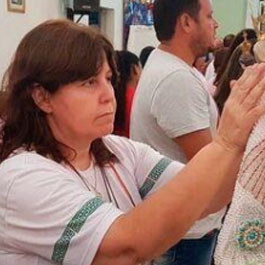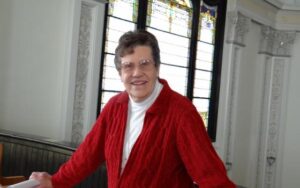
Share
My favorite corner in the whole world, that place where you arrive to replenish your strength on your way, is the Sanctuary of Our Lady of Nazareth. It is in the community of Recreio, the poor neighborhood of thatched houses in Altamira in the Brazilian Amazon. The matriarchs of the neighborhood tell me that mothers and daughters, between 30 and 80 years old, visited Bishop Clemente Geiger. What did this living Church talk about more than 61 years ago?
When I was a child I came with my family from Sao Paulo, the fourth largest city in the world, to the sacred territory of the Amazon. The shrine became my maternal home, where the matriarchs educated me in the faith. It is a community mainly of women who evangelize families in the community. They have been true “women deacons” for more than 61 years. They have educated in the faith all the generations of the oldest neighborhood of the city of Altamira, Recreio, where there are washerwomen and fishermen. These simple women talked to the bishop and told him they felt obliged to attend the imposing Cathedral because they did not have a parish. They asked him to make a chapel in the neighborhood of thatched houses, to pray and educate their sons and daughters in the faith. The Church listens.
I work with the Pastoral Office and already have 23 years of mission work in the Xingu. I live the joys and the suffering brought by large dams and mining projects. We denounce the abuse and exploitation of children, adolescent women, violence against young people, invasion of loggers, land grabbers, predatory extraction.
The Pastoral Office works with more than 692 ecclesial base communities, 10 parishes, five quasi-parishes, five pastoral regions, 10 municipalities, a region of rivers, local roads, villages, indigenous lands, conservation zones and areas of natural resource extraction. It is home to eight indigenous ethnic groups of the Middle Xingu: the Xipaya, Kuruaya, Asurini, Parakaná, Arara, Juruna, Xkrin, and Arawete, as well as several traditional and quilombola communities. The Amazon is “our common home,” as Pope Francis says.
The communities are very distant from each other. The priests can visit them every six months or once a year. We women are there! After the struggle and the daily work, we pray the rosary, we organize biblical circles, novenas. We are there in the chapel, waiting and organized, when the priest arrives to dock the boat or park the car.
What would become of the missionary teams and parish priests without us “women deacons” in the communities?
Women carry out 90 percent of the pastoral, liturgical and socio-environmental work in the Church in the Xingu. We only have 24 priests, 33 religious women, and five religious men for approximately 269,343 Catholics in a huge geographical distance of about 140,000 square miles. If it were not for the lay and religious women and men in the more than 692 Base Communities (544 rural and 88 urban), there would be no evangelization. But there is, because we, like the apostles in the time of Jesus Christ, take responsibility, and we are many: Marias, Marienes, Socorros, Raimundas, Madalenas, Josefas, Antonias, Ivonetes, Franciscas, Rosas, Estes, Malaques, Terezas….
I understood the call of God’s love with the people in the Amazon. My faith runs through my veins; I was born with it. It is rooted in the unwavering faith of my father José, in the service and dialogue of Bishop Erwin Krautler, in the defense of life of Father Savio Corinaldese, S.X. Evangelizing in the Amazon is a call and mission to be carried out with an open heart and soul, to enter into an intercultural dialogue that is assumed in the exchange of knowledge, experiences and feelings. It can only be worked in the collective to deepen the personal, the integral conversion, the synodality.
Sixty years ago, Bishop Geiger and the women realized there is no way to evangelize on this sacred ground among peoples without dialogue, service, announcement and testimony built collectively in simplicity, humility and the sharing of faith and life. This is how we evangelize in the Xingu. I am an apprentice to these “women deacons.” I affirm my love for God, the beloved Church and the beloved people.
Doris Almeida de Vasconcelos was born in Sao Paulo, Brazil, and raised in Xingu, Brazil, the heart of the Amazon. A consecrated lay woman of the Secular Franciscan Order, she is a catechist and socio-environmental activist in the Diocese of Xingu. She identifies as a defender of life and human and nature rights. She practices integral ecology with the support of the team of the Pan-Amazonian Ecclesial Network (REPAM).
Doris is an animator of Laudato Si’, part of the Xingu Committee of REPAM, and was an auditor at the Synod of Bishops for the Amazon that took place in Rome in 2019. She has a Bachelor of Arts, with a specialty in Language and Teaching, from the Federal University of Pará.
Receive Our Newsletter
This is the hub where we share relevant news, events and opportunities to participate in the work.
*We will send the newsletter only once each week, and we will never share or sell your information.


